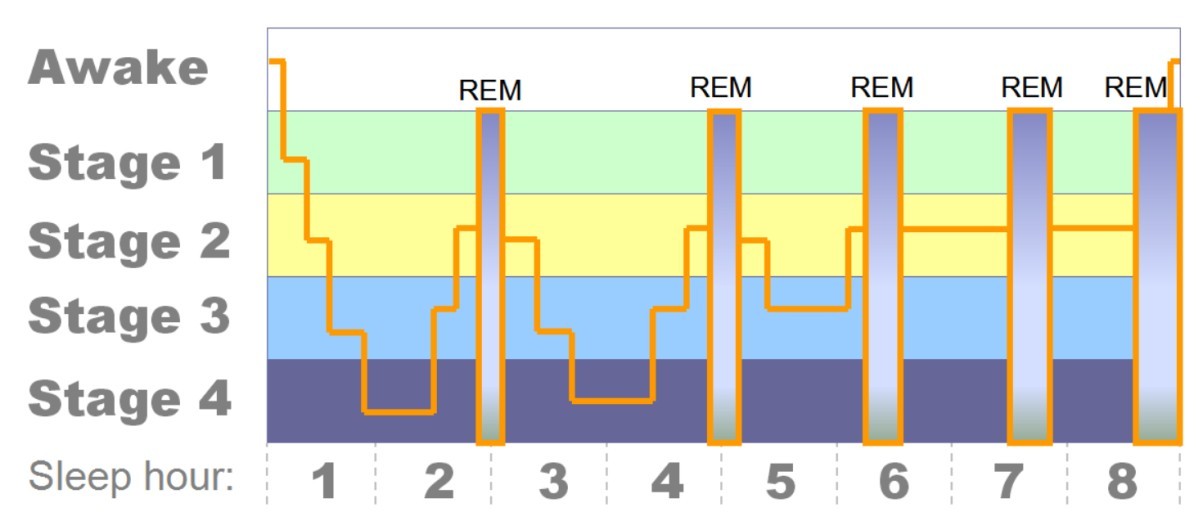I bet you know a lot about that fish with whiskers and sweet flesh, anointed with oils and spices, that sleeps its eternal sleep on your plate. Maybe because nutrition is largely a conscious and controlled decision.
Maybe you somehow started concerning yourself with your breathing, although this is not in your conscious care, because breathing is a natural action anyway. Meanwhile you’ve found out that inadequate breathing can induce stress in the body, and some techniques may reduce it or eliminate it. So you can do something before on your own initiative about the way you breathe it’s too late.
But I bet sleeping quality doesn’t concern you. After all, you have no power against it. It beats you anyway and whatever happens to you after you fall prey to it, you have to accept. If you have no idea about this, even better. But sleeping, even though sets you on autopilot mode, is a programming thing before and after waking up.
Studying about nutrition and breathing, or doing anything that captivates you, given this quite cramped life you live, maybe you stole some time from sleeping, from the only place that you could get resources to stay awake even longer. Find out why you shouldn’t do this…
On this page:
- 1 What is sleep and what is it made of?
- 2 Why are we sleeping?
- 3 Types of sleep: deep sleep vs. paradoxical sleep
- 4 Deep sleep makes you beautiful and smart
- 5 Paradoxical sleep helps you become more creative
- 6 How much should we sleep?
- 7 Too little sleep
- 8 Oversleeping
- 9 A nap – a necessity and an art
- 10 How sleep affects our personality
- 11 Sleep – the dark side of existence
- 12 “Sleep is God. Go worship!”
What is sleep and what is it made of?
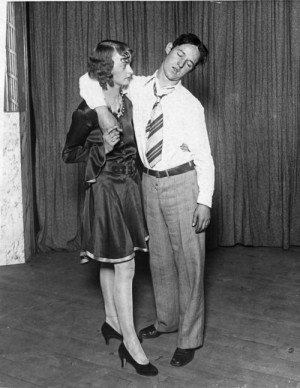
Remember parties until dawn when, at some point, you begin to feel some kind of weakness? Slow music, blurry lights, blues dancing couples… A feeling of drowsiness catches you, somehow a state on the border of waking and sleeping, disturbed by twitching and sensations of falling nowhere. Still hear the noises around, though faded, giving vague reaction signs, but you end up falling prey to the sweet sleepiness.
You just entered the first of the two phases of the sleep cycle, i.e. the phase called non-REM (non-Rapid Eye Movement). Specifically, the first stage of this first phase. Because after more than 10 minutes you are in a totally other phase; I’m gonna tell you what’s happening to you: you enter the second stage, the heart rate slows, breathing becomes more regular, eye movements stop, and muscles relax completely. You’re KO.
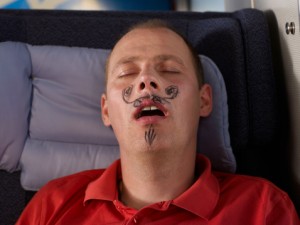
If your party fellows wait for about 20-25 minutes, until you get in the third stage (assimilating fourth stage, from the previous classification) 1)”Types and Stages of Sleep: Non-REM (NREM) Sleep” by Luc Mastin, article published in How Sleep Works, they can do whatever they want to you: tie you to the chair, smear your hands and mouth with ketchup… This last stage is the deepest and most restful as it is the quietest. Right now you can hardly be awakened. If someone has an unfortunate idea to blow a horn in your ear and suddenly wake you up, you’ll be so stunned that for a while you’re not going to know where you are.
In about 70-90 minutes after you fall asleep, you get out of the non-REM sleep phase and go into the second phase of sleep, named REM (Rapid Eye Movement) – because, simply, at this stage your eyeballs move (without you being aware of it).
This phase does not take more than 20 minutes, but is the most exciting. Now there is intense brain activity, given by rapid eye movement, cardiac and respiratory irregularities, congestion of sexual organs, etc. 2)”Sleep“in Encyclopædia Britannica.
It’s a paradoxical sleep, a third state of existence if I could put it like that, because it differs from the so-called “normal” sleeping (non-REM) and waking state. The frontal and middle lobe of the brain works at full potential, but the body is somewhat paralyzed. At this stage dreams occur.
Why are we sleeping?
Here’s a question that left researchers sleepless for decades. It’s funny, because sleep starts in the brain, from a range of interactions that take place here. The brain is the one that regulates the need for sleep, the brain directs sleep rhythm, but the brain never sleeps!
Sleep’s main function, whatever that is, has to do with neural activity 3)”Sleep: A Comprehensive Handbook” by Teofilo L. Lee-Chiong, book published by John Wiley & Sons in 2006.
Sleep disconnects totally or partially the body from the environment, making it more or less vulnerable to threats. What is the real reason that is worth putting you at such risk?
When sleeping, the dolphin “disables” only half his brain activity and closes the eye opposite to the side of the brain that rests. The other half remains vigilant, reminding him to rise to the surface to breathe. After a while, the process is repeated for the other half of the brain and eye that watched before. This is called “rest”.
When fen ducks sleep aligned, the two birds that sit on the ends keep half of their brain awake and one eye open to protect the flock.
Fish, reptiles, insects experience some sort of rest 4)”The Secrets of Sleep” by D.T. Max, article published in National Geographic in May 2010.
So sleep should have a vital function, if animals need it too.
There are many divergent theories about the real cause of this behavioral experience, which practically steals one third of our lives. The most popular are:
- restoration theory: body recovers during sleep. “What’s been shown is that within the brain, a whole raft of genes have been shown to be turned on only during sleep, and those genes are associated with restoration and metabolic pathways. So there’s good evidence for the whole restoration hypothesis,” says neuroscientist Russel Foster 5)”Why do we sleep?” – talk by Russel Foster at TED in June, 2013.
- conservation of energy: during sleep, the body saves energy. But the energy saved from 8 hours of sleep is almost the same as from a slice of toast. In the same way, the body can save calories and relax while being awake. But there are opinions that even a small amount of saved energy has a significant impact on survival and natural selection 6)”Why Do We Sleep? Energy Conservation” by Luc Mastin, article published in How Sleep Works.
- memory consolidation theory: synaptic connections that are important are strengthened and consolidated during sleep, and the less important ones tend to fade. “Sleep is the price the brain must pay for learning and memory,” Dr. Giulio Tononi says. “During wake, learning strengthens the synaptic connections throughout the brain, increasing the need for energy and saturating the brain with new information. Sleep allows the brain to reset, helping integrate newly learned material with consolidated memories, so the brain can begin anew the next day.” 7)”Sleep is the Price the Brain Pays for Learning“, article published in UW Health.
Scientists have their reasons for trying to find out why we are sleeping. It is possible that the answer to this question explains another mystery: why we cannot sleep when sleep disturbances occur? Neuroscience is such a vast and mysterious land that a stranger would get lost after the first steps.
But for us it’s enough to know the benefits from sleep, which help our physical and mental health, as well as the destructive effects of lack of sleep, in order to live a balanced life.
Types of sleep: deep sleep vs. paradoxical sleep
To summarize: a sleep cycle consists of two alternative stages, i.e. non-REM phase (3-4 stages with a duration of 70-90 minutes), followed by REM phase (lasting about 20 minutes). So the whole duration of a sleep cycle is 90-110 minutes.
On average, during one night, you go through 5 cycles like this.
Non-REM phase is called deep sleep.
REM phase is also called paradoxical sleep.
What you should know is that these cycles have different compositions during sleep. At the beginning of the night until about 3 am, cycles have more deep sleep and less paradoxical sleep. From 3 am up to about 7 am, the same 90-110 minute cycles contain less deep sleep (especially in stages 1 and 2) and more paradoxical sleep 8)”What is Sleep?“, article published by American Sleep Association.
Why is it good to know? Because this determines the quality of sleep, but the preponderance of body benefits given by these two types of sleep, which, experts say, have contradictory effects 9)”Introducere în psihologie” by Mielu Zlate, book published by Casa de editură şi presă “Şansa” in 1994.
So if you are use to going to sleep after midnight, you will dream more, but you’ll recover less.
Deep sleep makes you beautiful and smart
Deep sleep (non-REM) meets a role of growth, development and repair of the body, strengthening the immune system and is partially useful for the brain. During sleeping, hormonal and metabolic changes occur in our body.

While you sleep, your cells are renewed. Therefore, deep sleep is rightly called “beauty sleep”. And because beauty is not just your skin appearance, but rather intellectual and effective state, I remind you that during this phase of work, in parts of the brain that control emotions, the processes of decision making and social interactions is drastically reduced. This suggests that this type of sleep may help you feel refreshed for a new round of stress the next day 10)”What is Sleep?“, article published by American Sleep Association.
“During the day, we accumulate all these memories. At some point we have to sort through what has happened during the day. There are some things that we need to ‘lock down’ as a permanent hard memory. That process occurs in deep sleep. So anything that affects sleep will have an effect on that process to a greater or a lesser extent,” says Dr. Neil Stanley, a member of the Society of sleep Research UK 11)”Fragmented sleep ‘harms memory’“, article published by BBC News.

And I’ll give you another tip related to the state of deep sleep. You’ve heard about “sleep learning”. Research has shown that sleep promotes retention of a material even if it is meaningless (students can relate to this!). And this has led some authors to assert that humans forget faster after a period of activity than after one sleep. Memorizing performance grows by up to 50% if the material is presented in a sleepy state 12)”Introducere în psihologie” by Mielu Zlate, book published by Casa de editură şi presă “Şansa” in 1994.
(So do not worry next time your parents find you sleeping with a book in your hand. You can argue about this learning method…)
Paradoxical sleep helps you become more creative
It is known that the worst physical and mental effects of sleep deprivation come from a lack of deep sleep, not paradoxical sleep. Then what good could come from sleeping 20% more of the time, when there are so many things to be done?
Perhaps the benefits of paradoxical sleep (REM) are not to increase the memorizing capacity or mental alertness in general, but studies show that sleeping with dreams has a role in the creative process. Thus, researches conducted at Harvard, led by Robert Stickgold, subjected students to various tests of skill, allowing them to take a nap, then by testing them again. They found that subjects who had a paradoxical sleep scored better in tests for recognizing patterns, and those who slept deep had better results in terms of memory 13)”The Secrets of Sleep” by D.T. Max, article published in National Geographic in May, 2010.
Denise Cai, from University of California in San Diego, although not the first person who discovered the link between revelation and dream sleep, is one of the few who made experiments in this direction 14)”Sleeping on it – how REM sleep boosts creative problem-solving” by Ed Yong, article published in DiscoverMagazine on June 10, 2009. She believes that REM allows the brain to form new connections between existing ideas, but these connections are separated. When people are deprived of this type of sleep they aren’t as good at creative problem solving.
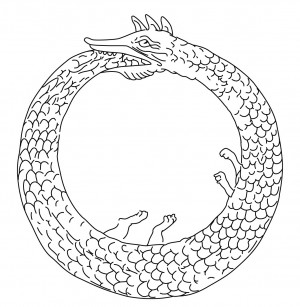
Proof for this theory are scientists who said their most significant discoveries were made after a good sleep. For example, the chemist Friedrich Kekule thought of the benzene ring structure after dozing in a chair and dreaming about ouroboros.
Maybe that’s why they say that “a good night’s sleep is the best adviser,” because, on one hand, sleep helps us find new solutions to old problems, and on the other hand, helps us to get past experiences loaded with suffering, as explained by Matthew Walker below, psychology and neuroscience professor at Berkeley University.
“We know that during REM sleep there is a sharp decrease in levels of norepinephrine, a brain chemical associated with stress. By reprocessing previous emotional experiences in this neuro-chemically safe environment of low norepinephrine during REM sleep, we wake up the next day, and those experiences have been softened in their emotional strength. We feel better about them, we feel we can cope.” 15)”Dream sleep takes sting out of painful memories” by Yasmin Anwar, article published in Berkeley News on November 23, 2011
How much should we sleep?
As a guide, a man who feels rested is awake throughout the day, without any “flat tires” in his activity due to sleepiness or feeling that struggle to stay awake. This means optimal quantity and quality of sleep, from which any deviation has repercussions on almost all areas of life.
All clear here, but what is the optimal amount for each one? That’s more difficult to determine because there are people who have a natural predilection to sleep longer (“long sleepers”) or less (“short sleepers”), without this affecting their normal functioning and health.
For example, if the average sleep for an adult is 8 hours per night, statistics show that 6-10% of the adult population seems to need more sleep than the average (9-10 hours), while about 5% are doing very well with more than 6 hours a day. In some extremely rare cases, less than 3 hours may be enough for some people to live normal 16)”How Much Sleep Do We Need?” by Luc Mastin, article published in How Sleep Works.

Factors such as age, sex, season, state of health, degree of intellectual activity, etc. have their influence, but do not offer a satisfactory explanation for these more than obvious differences. Then what is the explanation? It seems it’s all about the genes (and we’re not talking about those you dress with each and every day).
Genetics cover at least some aspects of each individual sleep requirements. DEC2 is a gene identified as specifically affecting the length of your sleep period, and some people with a mutation of this gene can live well with only 6 hours of sleep per night or less, instead of 8, which represents the need of an average normal person 17)”Rare Genetic Mutation Lets Some People Function with Less Sleep” by Katherine Harmon , article published in Scientific American on August 13, 2009.
ABCC9, a genetic factor involved in heart diseases and diabetes, also affects sleep duration. Through a study of more than 4,000 people belonging to some European populations, different scientists observed that people who have two copies of a certain gene variation of ABCC9 need less sleep each night (about half hour) than the rest of us 18)”The ABCC9 of sleep: A genetic factor regulates how long we sleep“, article published in Science Daily on November 25, 2011.
So if genes do not help you, there is no point in looking for solutions to sleep less, otherwise you’ll end up like the donkey of Nasreddin: when you start getting used to sleeping less, you hit the bucket.
Too little sleep
Like any good thing, sleep should be as much as needed, and the need of sleep is somewhat like the “personal identification number”, unique and non-transferable. You must listen to your body and respect its needs. Long periods of insufficient sleep do serious damage.
Sleeplessness works the brain overtime. A tired brain begins to show misfires: memory, concentration, learning discernment. If you exaggerate, the risks that you are exposed include depression, hallucinations, paranoia, and suicidal thoughts.

The brief involuntary drowsiness can easily slip into the “embarrassment” section when it starts happening in public and “fatal” if occurring at the steering wheel.
Lack of sleep increases levels of cortisol, a stress hormone 19)”What is the Connection Between Cortisol and Sleep?” by Erin J. Hill, article published in wiseGEEK.
Who doesn’t know that persistent stress primarily affects the immune system? Without a strong immune system, the body’s ability to fight infections lower. If you are prone to frequent colds, put sleep at the top of your preventive remedies list.
The more uncertain, the more alarming specialists’ observations are: “Increased levels of stress throw glucose into the circulation. Glucose becomes a dominant part of the vasculature and essentially you become glucose intolerant. Therefore, diabetes 2. Stress increases cardiovascular disease as a result of raising blood pressure,” warns Russell Foster 20)”Why do we sleep?” – talk by Russel Foster at TED in June, 2013.
And as a misfortune never comes alone, the deficiency of sleep lowers leptin, which is the satiety hormone. Therefore, increasing the ghrelin level, the hunger hormone and brain requires more carbohydrates. In particular sugar. The body is requested to release more insulin after eating. And so increases the risk of obesity by 50% 21)”Why do we sleep?“, lecture held by Russel Foster at TED in June, 201322)”The Effects of Sleep Deprivation on the Body” de Ann Pietrangelo, article published in Healthline on August 19, 2014.
But the vicious circle does not break here. If a tired brain doesn’t receive sleep, it asks for stimulants and drugs to keep it awake. Much of the day is fueled by caffeine. Then, some remain plugged by nicotine. When bedtime comes, because of their effect, you feel energetic. To sleep, you call upon either alcohol or sleeping pills, which ultimately doesn’t induce sleep, but rather sedates you. That inhibits some of the neural processes that occur during memory consolidation and recovery 23)”Why do we sleep?“, lecture held by Russel Foster at TED in June, 2013. All that you received, you give away.
Oversleeping
Sorry to shatter your dreams right now, when you were so eager to take a long nap. Studies show that too much sleep has the same unfavorable effect for skin as too little sleep does. Excessive sleep can lead to cell damage 24)”The Truth about Beauty Sleep” by Stephanie Watson, article published in WebMD.

Not if you’re Penelope Cruz, revealing that her radiant visage and flawless beauty is due to 15 hours of sleep daily 25)”Is too much sleep be bad for you?” by Roger Dobson, article published in Daily Mail. What can I say? You can lay in bed for 15 hours, dreaming of her beauty or you can wake up to reality and consider the possibility that whether she is the exception that proves the rule, whether there must be something other than excess sleep at the bottom of this.
If only the physical aspect was at stake in this sleeping game, maybe we would all give up beauty in favor of laziness, but too much sleep every day leads to a series of complications, back and/or headaches being among the lightest 26)”Physical Side Effects of Oversleeping“, article published in WebMD.
Therefore, if you get up after more than 9 hours still tired, having a loss of appetite, exhausted, specialist advice that either you should reduce your sleep schedule to 7-8 hours (assuming your biological clock is not disturbed), either consult a doctor to see if this hypersomnia is not hiding any serious medical problems.
Of course, there are some situations where prolonged sleep is necessary. Scientists have shown that two more hours of sleep reduce pain more effectively than an analgesic. This observation applied to the result of another study, which led to the conclusion that in the case of tired people, sensitivity to pain can be a consequence of inadequate sleep 27)”Extra sleep can be more effective than painkillers“, article published in The Telegraph on December 1, 2012.
A nap – a necessity and an art
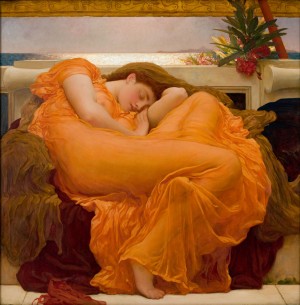
Some sleep researchers claim that interrupting the work program with short naps would be beneficial both for the body and increases productivity in the workplace. Dr. D.F. Dinges has shown that alertness and efficiency become increased after a nap, which can sometimes make the difference between life and death, especially if your profession is of great responsibility.
But do not take naps randomly (anytime, anyway, and any longer), otherwise you risk waking up groggy or you get insomnia at night. It’s good to consider a set of rules that help you extract maximum benefits from the afternoon snooze.
Because a quiet siesta calls for good resting conditions and a social atmosphere which agrees upon it as a habit, this healthy approach could become difficult to practice in modern societies. In the US, there are already companies that have decided to replace the coffee break with a quick nap break, providing those who want to take this nap with special sleeping cabins. A good coffee does not increase the productivity of workers as that of a nap does, and this significantly weighs on profit equations 28)”Good sleep, good learning, good life” by Dr. Piotr Wozniak, article published in Super Memo in May, 2012.
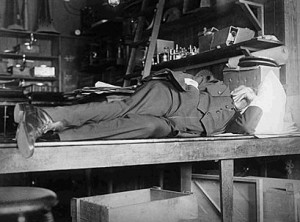
A clear mind is more creative and great personalities such as Albert Einstein, Thomas Edison, Napoleon, Winston Churchill, and J.F. Kennedy understood this aspect.

In Japanese society, those higher in the hierarchy practice inemuri, which means “to sleep while you’re out”. High ranking Japanese people are not reluctant to taking a nap during important meetings, if it’s really a need, and this is seen as a sign of labor generating outcome. Taking a nap is done in the upright position, suggesting social involvement. But not everyone can practice inemuri, because the unwritten laws make it affordable only to those who are higher on the social ladder. In addition, this technique requires a unique balance between professionalism and relaxation, which not everyone can acquire 29)”Culture Shock: Sleeping on the Job” by Jacob Holster, article published in Continental Machinery Movers on March 8, 2013.
In conclusion, do not hesitate to take a nap for 10-20 minutes, if the program allows it. You will see that not only your mind will collect the benefits, but also your body. To take a nap is a smart thing, because sleep, used wisely, makes you more intelligent!
How sleep affects our personality
You’ve surely heard the phrase “to get up on the wrong side of the bed”. All day you’re irritated, grumpy, cantankerous. Therefore, you can’t concentrate on the daily activities and everything seems to go up and backwards. In the evening, you conclude that you had a bad day, but do not even dream of thinking that actually the reason is too little or bad sleep.
In the long term, poor quality and insufficient sleep (disorderly, anxious, interrupted) progressively degrades mood and activity levels. Normally, to compensate for fatigue, overwork occurs, and without knowing it, you become agitated, depressed, and uncommunicative.
And this is more noticeable on the night that separates Sunday to Monday, when you know you have to get up to go to work. You’re agitated all night, tormented by insomnia. This result was reached by a British study applied to a group of 3,500 hotel employees. Also, research has shown that up to 23 million British employees say that work-related stress, including professional relations, robs them of about an hour of sleep each night.
Dr Neil Stanley, sleep expert at Norfolk and Norwich University Hospital, thinks that this weekly “insomnia” could be prevented by preserving the same rhythm of sleep and waking on the weekends, without losing time in bed in the morning and half night sleep or none at all on the weekends 30)”Sunday ‘worst sleep’ of the week“, article published by BBC News.
In addition, mental activities during the days you don’t go to work will keep your brain idle, and physical activity will keep your body in shape without interruption.
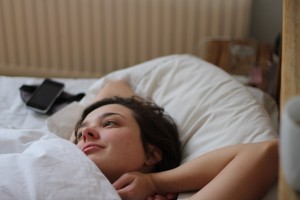
Conversely, a rested person is not just healthy, cheerful, and gracious, but a person capable of thinking more abstract, in problem solving, with a good memory, and smoother movement coordination 31)”What Your Sleeping Style Says About You“, article published in WebMd.
From another perspective, it was found that those who sleep less tend to be energetic and more effective, while those who sleep more are depressed, anxious, and tend to criticize all those around. Also, these two categories of individuals differentiate between themselves by the quality of their needs: those who sleep less have high necessities, while those who sleep more have low necessities, more primary 32)”Introducere în psihologie” by Mielu Zlate, book published by Casa de editură şi presă “Şansa” in 1994.
Sleep – the dark side of existence
In conclusion, whoever you are, however you are, and wherever you are, one thing is certain: you need sleep. If your lifestyle has brought you some for of sleep disorder, insomnia even, it is useful to find a way to fall asleep as quick as possible.
Whatever your tactics are, do not count sheep (especially if you are a manager who has just received an inventory decision), because it is by far the most inefficient method studied. But I’m not going to be so insensitive as to offer you the ancient Roman method, namely to massage your feet with hamster fat or rub your teeth with wax taken from the ear of a dog 33)”The Second Book of General Ignorance: Everything You Think You Know Is (Still) Wrong” by John Lloyd and John Mitchinson, book published by Crown in 2011.
From my point of view, instead of looking for a way to fall asleep faster, better prepare yourself for some time before you tuck yourself into the sheets. Your brain isn’t an electrical switch. Natural sleep need not simply render you unconscious in an instant; your brain sends signals to facilitate transition gradually until finally you fall asleep.
It’s no need for complicated rituals, only a program and a personal routine that should slowly take you away from the day’s activities and prepare yourself to enter on your own in a different physiological state, sort of a recovery mode.

For our ancestors in the pre-industrial era things were simpler, because their rhythm was governed by the laws of nature. As night fell, there weren’t many things to do, especially in long winter nights. So, their sleep was bi-phased: the beginning of the night sleeping 3-4 hours, 1-2 hours of wakefulness followed, then the second half of sleep until dawn.
During the awake time, they got out of bed, went to the toilet, read by candlelight, talked to family members, prayed, meditated, or made love… Yes, made love. Loud mouths (I mean sources) say that this was the best time for sex, not the end of a tiring day of work. After a good sleep, and without caring that the day started without them, people were more eager towards fooling around and “did it better” 34)”The myth of the eight-hour sleep” by Stephanie Hegarty, article published by BBC News on February 22, 2012.
With the appearance of street lights and socializing during the night, people’s simple pleasures appear to have become increasingly complicated…
“Sleep is God. Go worship!”

How often has sleep taken you by surprise, literally stealing you in the middle of your work, while you’re watching a movie at night, typing on your laptop, lying on the bed, just a little before bed, or pushing hard to complete the project for the next day? And how many times in the morning have you felt frustrated that you missed the ending or because you didn’t finish your work?
How many times did you come back home late at night from hanging out with some friends or from a late night shift and you jumped, deadbeat, straight into bed with the same resignation with which you take a pill whenever you have a headache?
We no longer live in the days of our ancestors, dependent entirely on nature. We have technology to turn day into night and night into day. We stopped relying on the singing of the rooster at dawn to awaken us; we have alarms able to wake us up at any desired second. Almost any job can be done as well in the night as it is done during the day, thanks to electricity.
Unfortunately, electric lighting has not brought us enlightenment; otherwise, we should have realized that our biological clock is still ticking in an ancestral pace, without taking into account the dizzying social pace that we throw it in. We have realized that sleep, like being awake, is the other side of our existence, and without healthy sleep we cannot speak of a healthy life.
“Sleep is God. Go worship!” writer Jim Butch said. I subscribe to that view and add to it myself: Give the Caesar (awaken state) what is Caesar’s, and unto God (sleep) what is God’s. This is just what I do every night: I close my eyes and give God the day that has passed – a tangle of desires, needs, achievements, mistakes, tensions, and pleasures. And instead of yesterday, through sleep, he gives me a shiny new day…
A guide, for everyone, about the human body substances that are of grave importance to your health
References
| ↑1 | ”Types and Stages of Sleep: Non-REM (NREM) Sleep” by Luc Mastin, article published in How Sleep Works |
|---|---|
| ↑2 | ”Sleep“in Encyclopædia Britannica |
| ↑3 | ”Sleep: A Comprehensive Handbook” by Teofilo L. Lee-Chiong, book published by John Wiley & Sons in 2006 |
| ↑4 | ”The Secrets of Sleep” by D.T. Max, article published in National Geographic in May 2010 |
| ↑5, ↑20 | ”Why do we sleep?” – talk by Russel Foster at TED in June, 2013 |
| ↑6 | ”Why Do We Sleep? Energy Conservation” by Luc Mastin, article published in How Sleep Works |
| ↑7 | ”Sleep is the Price the Brain Pays for Learning“, article published in UW Health |
| ↑8, ↑10 | ”What is Sleep?“, article published by American Sleep Association |
| ↑9, ↑12, ↑32 | ”Introducere în psihologie” by Mielu Zlate, book published by Casa de editură şi presă “Şansa” in 1994 |
| ↑11 | ”Fragmented sleep ‘harms memory’“, article published by BBC News |
| ↑13 | ”The Secrets of Sleep” by D.T. Max, article published in National Geographic in May, 2010 |
| ↑14 | ”Sleeping on it – how REM sleep boosts creative problem-solving” by Ed Yong, article published in DiscoverMagazine on June 10, 2009 |
| ↑15 | ”Dream sleep takes sting out of painful memories” by Yasmin Anwar, article published in Berkeley News on November 23, 2011 |
| ↑16 | ”How Much Sleep Do We Need?” by Luc Mastin, article published in How Sleep Works |
| ↑17 | ”Rare Genetic Mutation Lets Some People Function with Less Sleep” by Katherine Harmon , article published in Scientific American on August 13, 2009 |
| ↑18 | ”The ABCC9 of sleep: A genetic factor regulates how long we sleep“, article published in Science Daily on November 25, 2011 |
| ↑19 | ”What is the Connection Between Cortisol and Sleep?” by Erin J. Hill, article published in wiseGEEK |
| ↑21, ↑23 | ”Why do we sleep?“, lecture held by Russel Foster at TED in June, 2013 |
| ↑22 | ”The Effects of Sleep Deprivation on the Body” de Ann Pietrangelo, article published in Healthline on August 19, 2014 |
| ↑24 | ”The Truth about Beauty Sleep” by Stephanie Watson, article published in WebMD |
| ↑25 | ”Is too much sleep be bad for you?” by Roger Dobson, article published in Daily Mail |
| ↑26 | ”Physical Side Effects of Oversleeping“, article published in WebMD |
| ↑27 | ”Extra sleep can be more effective than painkillers“, article published in The Telegraph on December 1, 2012 |
| ↑28 | ”Good sleep, good learning, good life” by Dr. Piotr Wozniak, article published in Super Memo in May, 2012 |
| ↑29 | ”Culture Shock: Sleeping on the Job” by Jacob Holster, article published in Continental Machinery Movers on March 8, 2013 |
| ↑30 | ”Sunday ‘worst sleep’ of the week“, article published by BBC News |
| ↑31 | ”What Your Sleeping Style Says About You“, article published in WebMd |
| ↑33 | ”The Second Book of General Ignorance: Everything You Think You Know Is (Still) Wrong” by John Lloyd and John Mitchinson, book published by Crown in 2011 |
| ↑34 | ”The myth of the eight-hour sleep” by Stephanie Hegarty, article published by BBC News on February 22, 2012 |
Did you like it? Now it’s your turn. You’ll make us very happy if you share this article with your friends:
And don’t forget to let us know what you think – we are really interested in your thoughts on this!



